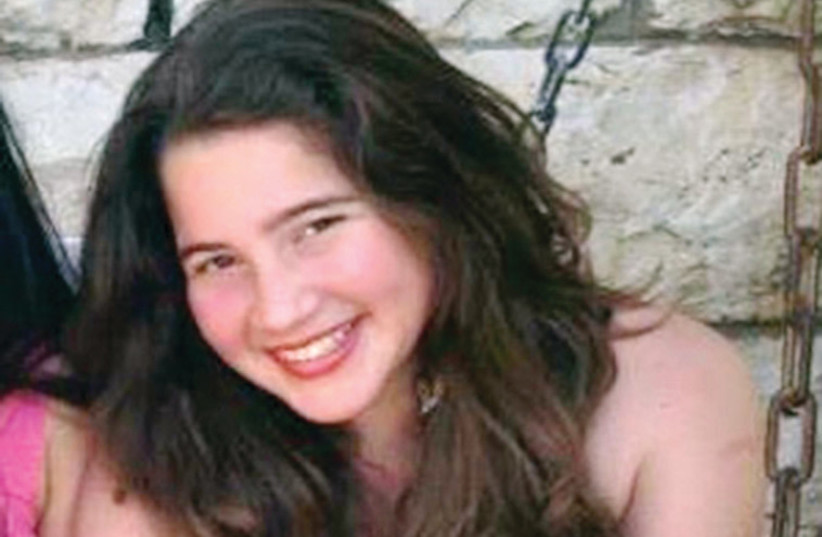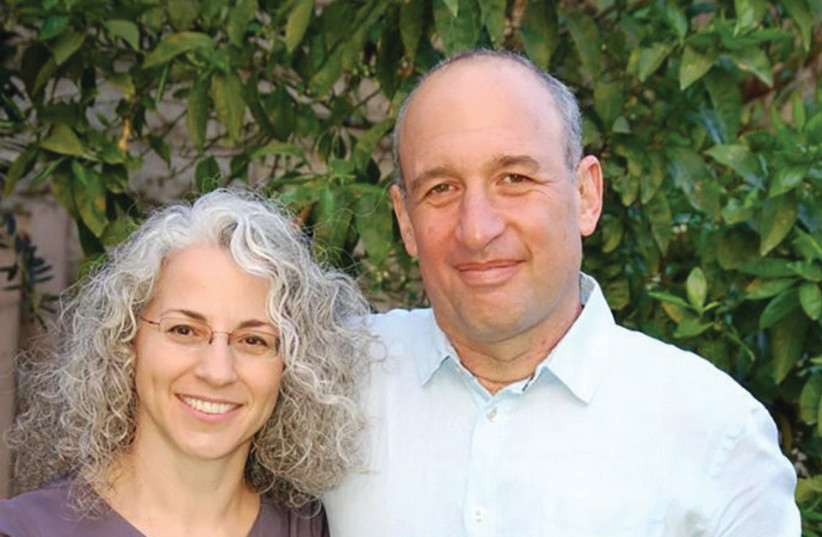Uri Banki’s voice registers great emotion as he tells me how he and his wife, Mika, were invited to light a torch at this year’s official Independence Day ceremony at Mount Herzl in Jerusalem. Uri and Mika are the parents of Shira Banki, who was murdered at age 15 while participating in the 2015 Jerusalem Pride Parade.
“We felt chills of excitement and pride when we learned we’d been chosen,” Uri recalls. “I don’t think I can say that we’re happy, considering what happened to Shira, although everything connected to Shira brings about happiness. But we do feel pride.”
“Mika and Uri are an example of people’s great ability to bring about change, and to teach others how to make Israel and the world a better place than it was before,” exclaimed Culture Minister Chili Tropper.
“In their eulogy of Shira at the funeral, they said, ‘We will try to hate less and love more, and we will aim to help other people follow your example.’ Since then, Mika and Uri have gone to great efforts to bring together various Israeli organizations to carry out this goal.”
On July 30, 2015, Shira Banki was stabbed to death at the Jerusalem Pride Parade in Jerusalem by Yishai Schlissel, an ultra-Orthodox Jew. Just a month beforehand, Schlissel had been released from prison after serving a 10-year sentence for a similar assault at the Pride Parade in 2005, for which he was convicted of attempted murder. Following his murder of Banki, he was sentenced to life in prison.

Do you recall the last conversation you had with Shira?
“Of course – it was just before she left home for the Pride Parade,” says Uri. “I asked her to swing by the house after the parade before going to her babysitting job, since my friends from reserve duty were coming over for a barbeque, and I wanted them to see what an incredible daughter we have. But she never did make it home.”
<br>What is the greatest thing you’ve learned from Shira?
“I’ll share an anecdote with you. A few months before the murder, we were driving in the car the whole family, and before we left home, someone said: ‘Pray that it’ll rain today,’ to which I responded sarcastically and cynically, ‘In our family, no one prays.’ Shira jumped in and said, ‘Abba, that’s not very nice. Some people believe in God, and we need to show respect for them.’
“This interaction has remained in the forefront of my mind ever since. I learned from Shira that it’s not okay to define my personal identity by putting someone else down. Mocking religious Jews does not make me an even more secular person, just like mocking homosexuals and people with other sexual orientations does not make me any more heterosexual.
“I may have been the adult in the relationship, but I learned so much from all the interactions I had with my daughter.”
<br>Has the intensity of the pain lightened over the years?
“Not really. But everyone who loses a loved one has their own unique grieving experience. Some people say the pain actually increases over the years, but this has not been the case for me, and I don’t think it’s helpful to talk about it this way.
It’s true ‘that the pain has dulled somewhat, but it certainly hasn’t disappeared. I still miss Shira every single day. I make a great effort not to let my mind wander off into thoughts about why this happened to our family, where Shira is now, and why I can’t talk with her anymore. Engaging in this kind of thinking brings me to a bad place.”
IN 2016, a few months after Shira was murdered, Mika and Uri, who are both lawyers, founded Shira Banki’s Way, a nonprofit that engages in educational activity to promote positive values and tolerance in the public sphere.
“When the shiva mourning period ended, and Mika and I were left all on our own in the house, we realized that we were lost, without anything to look forward to,” Uri recalls.
“We knew we had to make a decision. We had a choice to either try to get back to regular life, focus on work, the house and the kids, or we could galvanize the energy and momentum following the murder and do something with it.
“So, we began meeting with lots and lots of people who wanted to take this awful event and turn it into something positive. We searched for a way to take this burning desire inside us to do something good for Israeli society in Shira’s name. It would have been so easy to just go back to our small lives, but we thought – what would Shira have wanted us to do? And the answer was clear: Do something meaningful.”

How has being active with Shira Banki’s Way affected the grieving process?
“Well, everyone grieves in their own way. For us, coming together to engage in educational activity has helped us find a positive channel for our feelings. Being active together with family and friends has helped us get through this difficult time.
“We wrote the following on her gravestone: ‘It is better to teach about good than to condemn the bad.’ We could have spent all our energy focusing on the trial of the murderer and negative activity. I don’t judge people who ended up doing this – everyone has to find their own way to keep sane. But we chose to engage in positive activity – to meet with youth, to do good and to help people.”
<br>What kind of activities is Shira Banki’s Way involved in?
“When a person stands up on a stage, be it real or virtual, and cries out, ‘Death to homosexuals, death to Bibi supporters, death to anti-vaxxers, death to left-wingers, death to Arabs,’ you don’t have to ask them what their goal is. It’s clear that they want to create strife, hatred and division, all while drawing attention to themselves.
“What we want to do is exactly the opposite – to draw people to a place of acceptance, respect and appreciation of others.
“When I participate in a gathering that brings together school-age children from religious, secular and haredi families, I feel the positive energy that’s created as a result.
“When I lead workshops with Jewish and Arab teachers in Jerusalem, or record a podcast featuring individuals who engage in activity for the betterment of our communities, I am brought to tears by all the good that comes as a result of these activities.”
<br>Do you feel like these activities have become even more important in light of the increased friction we’ve been experiencing in recent years?
“Yes, absolutely. The rise in the levels of hatred and incitement to violence have led to so many horrible incidents. This only reinforces our sense that we need to hunker down and encourage as many people as possible to join us in engaging in positive educational activity. I’ve met with countless teens and IDF soldiers, and listened to them describe the tensions they experience.
“We must invest more energy, time and funds to help our young people engage in positive activism. It’s wonderful that our society is made up of people from many different communities, but we need more people to appreciate each other and to understand that everyone in society is worthy of respect. We must rid our society of hatred and incitement.”
Immediately following the announcement that Uri and Mika Banki had been chosen to light a torch at this year’s Independence Day ceremony, Rabbi Amital Bareli, director of the hardline religious-Zionist organization Chotam, tweeted a bullying homophobic remark.
“This man said what he wanted,” continued Uri, “and succeeded in making noise and being quoted in the media. On the other hand, former MK Yehuda Glick, who is not known as a LGBTQ supporter, reached out to us personally to applaud our being chosen to light one of the torches. He also came to the hospital when Shira was stabbed in order to express his solidarity with us in our struggle against violence.
“He even wrote on kipa.co.il, ‘I side with Uri and Mika Banki, and not with Amital Bareli. Even if my own personal opinion might be closer to Bareli’s, derech eretz (respecting others) is a thousand times more important than Torah.’”
<br>Did COVID-19 affect activity at Shira Banki’s Way?
“Yes. We held as many meetings and events as we could on Zoom, and the rest unfortunately we had to postpone or cancel. It definitely put a damper on our activity and outreach programs, since almost all of it involves frontal gatherings.
“Everyone was hit hard by the pandemic, many much more than we were, and we’ve managed to keep a minimal amount of activity going on virtually, so that we could get back to a full range of activity once things calm down.”
<br>What do you wish for Israeli society during the Independence Day period?
“That we should all strive to engage with our neighbors and fellow citizens with courteous language, and to understand that we are all human beings deserving of respect, regardless of our religion, culture or sexual preference. That we were all created in the image of God, and need to show tolerance of people who are different from ourselves. To choose good over bad.” ■
Translated by Hannah Hochner.
